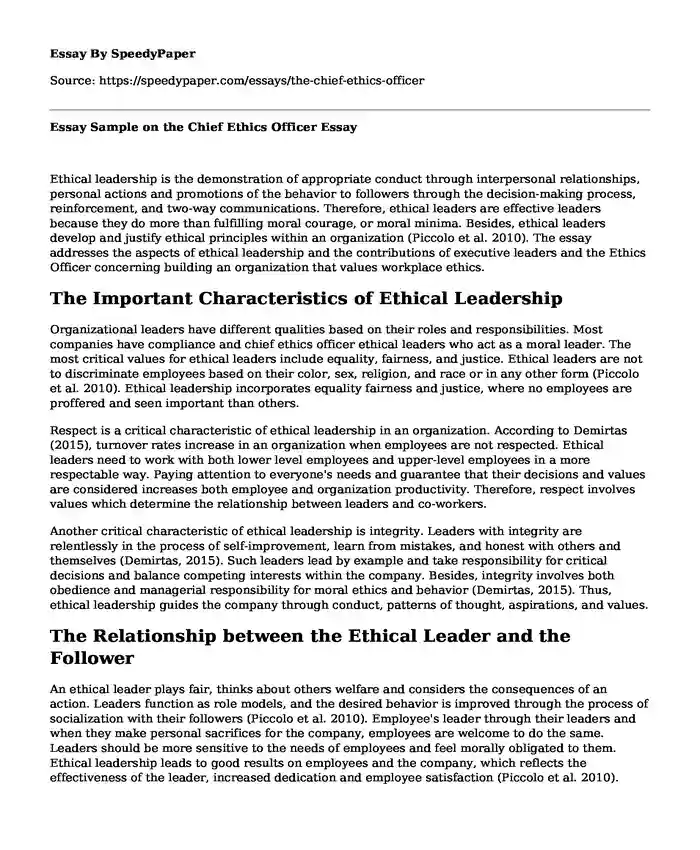
| Type of paper: | Essay |
| Categories: | Relationship Organizational behavior Ethical dilemma Personal leadership |
| Pages: | 3 |
| Wordcount: | 755 words |
Ethical leadership is the demonstration of appropriate conduct through interpersonal relationships, personal actions and promotions of the behavior to followers through the decision-making process, reinforcement, and two-way communications. Therefore, ethical leaders are effective leaders because they do more than fulfilling moral courage, or moral minima. Besides, ethical leaders develop and justify ethical principles within an organization (Piccolo et al. 2010). The essay addresses the aspects of ethical leadership and the contributions of executive leaders and the Ethics Officer concerning building an organization that values workplace ethics.
The Important Characteristics of Ethical Leadership
Organizational leaders have different qualities based on their roles and responsibilities. Most companies have compliance and chief ethics officer ethical leaders who act as a moral leader. The most critical values for ethical leaders include equality, fairness, and justice. Ethical leaders are not to discriminate employees based on their color, sex, religion, and race or in any other form (Piccolo et al. 2010). Ethical leadership incorporates equality fairness and justice, where no employees are proffered and seen important than others.
Respect is a critical characteristic of ethical leadership in an organization. According to Demirtas (2015), turnover rates increase in an organization when employees are not respected. Ethical leaders need to work with both lower level employees and upper-level employees in a more respectable way. Paying attention to everyone's needs and guarantee that their decisions and values are considered increases both employee and organization productivity. Therefore, respect involves values which determine the relationship between leaders and co-workers.
Another critical characteristic of ethical leadership is integrity. Leaders with integrity are relentlessly in the process of self-improvement, learn from mistakes, and honest with others and themselves (Demirtas, 2015). Such leaders lead by example and take responsibility for critical decisions and balance competing interests within the company. Besides, integrity involves both obedience and managerial responsibility for moral ethics and behavior (Demirtas, 2015). Thus, ethical leadership guides the company through conduct, patterns of thought, aspirations, and values.
The Relationship between the Ethical Leader and the Follower
An ethical leader plays fair, thinks about others welfare and considers the consequences of an action. Leaders function as role models, and the desired behavior is improved through the process of socialization with their followers (Piccolo et al. 2010). Employee's leader through their leaders and when they make personal sacrifices for the company, employees are welcome to do the same. Leaders should be more sensitive to the needs of employees and feel morally obligated to them. Ethical leadership leads to good results on employees and the company, which reflects the effectiveness of the leader, increased dedication and employee satisfaction (Piccolo et al. 2010).
The importance of Ethical Leader and Follower Relationships
The ethical leader-follower relationships can favor organizations based on the influence it has on employee performance. Ethical leadership engages employee behaviors that promote support, recognition, mentoring and coaching tools which promote collaboration among team members (Demirtas, 2015). The influence of the leader, therefore, results in employee initiative, engagement, and performance. Therefore, ethical leaders influence employees directly through coaching, encouragement, support, and constructive relationship leading to superior performance in the organization.
The role of the Chief Ethics
The ethics officer is role and responsibility of creating and allocating codes and ethics, monitoring and auditing the company's compliance based on government regulations, and developing training programs for employees. Therefore, the ethics officer function within the company's internal point of control including conflicts of interests, complaints, allegations, and improper ties, while at the same time providing advice on organizational issues (Piccolo et al. 2010). Ethics officer are important within corporate governance as they help the company to understand how it can be governed, managed and dieted including relationships among the company and employees, shareholders, and the state based on the objective and goals of the company. Thus, the ethics officer helps the company raise awareness on advice, training, and risks that the company might be involved.
Conclusion
Competitiveness and ethics cannot be separated when it comes to the success of a company. It pays to be ethical since companies with ethical leadership and codes of business ethics are more productive when compared to companies that are without a code of ethics. Therefore, ethical leaders are effective leaders because they do more than fulfilling moral courage, or moral minima. Besides, ethical leaders develop and justify ethical principles within an organization.
References
Demirtas, O. (2015). Ethical leadership influence at organizations: Evidence from the field. Journal of Business Ethics, 126(2), 273-284.
Piccolo, R. F., Greenbaum, R., Hartog, D. N. D., & Folger, R. (2010). The relationship between ethical leadership and core job characteristics. Journal of Organizational Behavior, 31(23), 259-278.
Cite this page
Essay Sample on the Chief Ethics Officer. (2023, Jan 06). Retrieved from https://speedypaper.com/essays/the-chief-ethics-officer
Request Removal
If you are the original author of this essay and no longer wish to have it published on the SpeedyPaper website, please click below to request its removal:
- Episode Details "Stranger in Town". Free Essay Sample.
- Free Essay on Feminist Criticism and The Yellow Wall-Paper
- Essay Sample with a Contextual Discussion on the Adaptation to Heart Failure
- Substance Dependence and Abuse, Free Essay for Everyone
- Impact of Musical Interventions on Language and Cognitive Development
- Multiple Sclerosis and Fitness, Essay Example
- Reflection Essay Sample on Personal Development and Group Interaction
Popular categories




